- Home
- Henrik Ibsen
Peer Gynt and Brand Page 16
Peer Gynt and Brand Read online
Page 16
BRAND [shaking his head]:
Child, let them be: weak, struggling men.
Let them strive and stumble on
until they fall.
GERD: You’ll never fall.
For on your head’s the thorny crown;
and in your hands the prints of nails
bear witness that you’re God’s dear Son.
BRAND: I am the meanest thing that crawls.
GERD [looking upward; the clouds are breaking]:
Do you see where we are?
BRAND: I see the mountain and the stair
clear through the mist; the pure ascent,
the void that is the firmament.
It is the Ice Church!
GERD [uttering a wild cry]:
Yes! Now you come!
BRAND [starting to weep]:
Redeemer, when I called Your name,
prayed for the comfort of Your arm,
You passed close by and never heard.
Dear name, the ghost of an old word …
Redeemer, look, I try to touch
Your white robe, but I cannot reach.
Sinners whose tears have stained its hem
put all my agony to shame.
GERD [pale]:
Oh now the priest-of-ice
is melting; rags and tatters drop
from his glacier cope;
the tears pour down his face.
The ice in my own brain
melts to a gentle rain
and all that freezing fire
is gone. You would not weep before.
Why? Why?
BRAND [radiant and as if reborn]:
Narrow was my path,
straitened between wrath and wrath.
My own heart was the Sinai slate
on which the hand of God could write.
Before this hour, until this place,
I knew no other power, no grace,
beyond my own unyielding will.
But now the sunshine and the thaw.
And life shall be my song. Here, now,
I am released, and kneel!
GERD [looking upward and speaking slowly and fearfully]:
Silver to silver, steel to flesh
of ice where those great feathers thresh:
look how he beats against the rock.
Now, silver bullet, flash and strike!
She puts the rifle to her shoulder and fires. A hollow booming, as of a roll of thunder, sounds from high up the mountain face.
BRAND: What have you done?
GERD: That strange white bird,
he screamed; he screamed as I fired!
Silver-white ice-dove, do you cry
with terror now? Ah, the beauty!
He’s plunging down, he’s scattering
whirlwinds of feathers from each wing;
a mountain whirling like a swarm
of feathery snow. And now that scream,
nearer, nearer … Oh the noise, the noise!
She throws herself down in the snow.
BRAND [shrinking under the approaching avalanche and crying out]:
Tell
me, O God, even as Your heavens fall
on me: what makes retribution
flesh of our flesh? Why is salvation
rooted so blindly in Your Cross?
Why is man’s own proud will his curse?
Answer! What do we die to prove?
Answer!
The avalanche buries him. The whole valley is filled.
A VOICE [calling through the noise of thunder]:
He is the God of Love.33
PEER GYNT
* * *
A version by Geoffrey Hill based on a literal translation by Janet Garton and edited by Kenneth Haynes
Characters
AASE, widow of a farmer
PEER GYNT,1 her son
TWO PEASANT WOMEN with sacks of grain
ASLAK, a blacksmith
WEDDING GUESTS, MASTER OF CEREMONIES, FIDDLER, etc.
AN INCOMER and his WIFE
SOLVEIG and HELGA, their daughters
THE HÆGGSTAD FARMER
INGRID, his daughter
MADS MOEN, the bridegroom, and his PARENTS
THREE GIRLS from the seter2
A WOMAN IN GREEN
THE TROLL KING3
TROLL COURTIER and others like him
TROLL MAIDENS and TROLL CHILDREN
TWO WITCHES
AN UGLY CHILD
BOYG4
BIRD VOICES
KARI, a crofter’s wife
MR COTTON, M. BALLON, HERR V. EBERKOPF, HERR TRUMPETERSTRAALE, travelling gentlemen
A THIEF and A FENCE
ANITRA, daughter of a Bedouin chieftain
ARABS, FEMALE SLAVES and ATTENDANTS at a Moroccan camp
THE STATUE OF MEMNON (singing)
THE SPHINX AT GIZA (silent)
BEGRIFFENFELDT, Professor, Ph.D., director of the Cairo madhouse
HUHU, an advocate of language reform from the Malabar coast
A FELLAH carrying a royal mummy
HUSSEIN, a Near Eastern cabinet minister
SEVERAL INMATES OF THE MADHOUSE together with their GUARDS
A NORWEGIAN SHIP’S CAPTAIN and his CREW
A STRANGE PASSENGER
A PRIEST
A FUNERAL PROCESSION
A SHERIFF
A BUTTON MOULDER
A THIN MAN
Act One
SCENE 1
A hillside with deciduous trees near AASE’s farm. A rushing river. An old mill on the opposite bank. A hot summer’s day. PEER GYNT, a strongly built twenty-year-old boy, comes down the path. AASE, his mother, small and slight, follows him. She is angry and scolding.
AASE: Lies, Peer, lies!
PEER [without stopping]:
Plain truth it is!
AASE: Swear then!
PEER: Why?
AASE: Affeared to? Fie!
Such stuff and all; such rigmarole!
PEER [stopping]:
’Strewth, Ma!
AASE [in front of him]:
You’re shameless! First you took
off up the fells, left me the work –
spent though I am – sloped off to stalk
reindeer (you said) among the crags.
Return in rags, without your gun –
months you were gone – and meatless too.
D’you think I’ll eat your lies, lad? So:
where was that buck you almost took?
PEER: West, by Lake Gjendin.5
AASE [laughs scornfully]:
More tall tales!
PEER: Bitter it was, mind, a dread wind,
and he behind an alder-tump the whiles.
Moss he was after.
AASE [as before]:
Take me for daft, Peer?
PEER: Heard his hoof scraping. Saw his tines.
Didn’t dare breathe, hugging the stones,
on my belly, there in the gully,
chanced a quick look – oh, Ma! – that buck
all plump and gleaming! You’ve
seen never the like!
AASE: Believe
that, who feels free to!
PEER: Crack-o! Whack!
Down goes the buck! I’m on his back,
grab his left ear, see here, rear-skull,
straight to the spot, my hunting-steel
to make the kill. The brute is up!
A single leap, a beastly cry,
and we’re away!
Knife lost, torn from my fist,
my calves, my thighs, gripped fast
by some contortionist
it seemed; I mean, his horns
gripped me like pincers: for, some twist
of nature there possessed that creature.
We rode at the charge
along Gjendin Ridge!6
AASE [involuntarily]:
Bless, us, sweet Saviour!
PEER: Have you ever
been up along that razor-back?
Two miles of track; and sheer
its drop. Look! scree, glacier,
voiding themselves to either side.
Two thousand feet you’d fall, not slide.
So: there we were, riding air,
me and my steed at such a speed,
racing those suns – ay, they were many –
whirling about us, small and shiny.
We could look down
on eagles high above the tarn,
a snatched look as we overtook.
Seen but unheard the ice-floes broke
against the shore. Those earth-sky-folk –
Vættir – you know – surrounded us,
shrilling wild songs, and hounded us.
AASE [dizzy]:
Lord ’a’ mercy!
PEER: In that very
place – now hear me! – quite the worst –
a ptarmigan, of all things, burst
out of hiding, flap and shriek,
just where the buck and I were striding.
Upon the instant, we had swung
out from the ridge and hung
over a gulf.
[AASE staggers and takes hold of a tree trunk. PEER continues.]
Behind us, sheer,
the cliff-side, black; beneath us, ne’er
a glimpse of ground. Mists we cleft, broke
through many a wailing flock
of seagulls. Down and down we came
until, deep in the tarn’s womb,
a thing began to glimmer palely,
whiteish, like a reindeer’s belly.
AASE [gasping for breath]:
Peer, lad, you mean …?
PEER: Lordy, yes! It was our own
image that rose as we plunged down,
pace for pace; the tarn’s face
broke like a mirror. Their horns lock –
buck from the air with phantom buck,
all in a fleeting! Spray’s far-flung,
rainbows we dip our toes among!
At length the buck begins to swim
in earnest; I hold fast to him;
we reach the north shore; I head home—
AASE: But where’s the buck?
PEER: Maybe still there;
[Clicks his fingers, turns on his heels and adds:]
first come first served, and none to spare!
AASE: Lad, let me take it in! Your neck
not broken! Both your legs and back,
right as a trivet: God be praised
for keeping safe the boy I raised!
The seat’s out of his trousers, h’m;
today, nary a word of blame
shall pass my lips. Even to think
how close he came …
[Suddenly stops, looks at him with open mouth and wide eyes, is speechless for a long time, finally bursts out.]
Damned mountebank!
God help us, what a liar,
what a liar you are!
That fable you’ve just spun:
Gudbrand Glesne7 ’twas that took
the famous ride astride a buck.
A wench of twenty, I first heard
that tale; it’s here, still in my head!
PEER: Ain’t I just like him? ‘Gudbrand rides again!’
Folk can repeat the same feat.
AASE [furious]:
Well, yes, a lie can (truth to tell)
strut in fine clothes to work us ill.
Like a death’s head ’twould be, if known.
Such is your ill work, my son:
nothing decent and home-spun,
crazy high talk of eagles, bucks,
rides through the clouds on phantoms’ backs,
such dreadful lies – small things and great
made falsehood to give folk a fright.
And, what’s to me most terrible,
your own soul stuck ’twixt truth and fable!
PEER: If anyone else than you
said that to me, I’d beat ’em black and blue!
AASE [weeping]:
Wish to God I were dead,
that deep in black earth I was laid;
prayers and tears of no avail
to keep him from hell.
PEER: Dear little sweet Mother,
it’s true, all you say,
but best not to bother,
live life for the day.
AASE: I, who have borne
such a pig of a son?
Be happy – how can I,
without friends or money,
but rich in shame,
poor widow that I am?
[Renewed weeping]
Where have they gone,
those coffers of coin?
Grandad, old Rasmus Gynt,
got them, enjoyed their glint.
Your father gave them leave
to wander off, or scattered them like sand:
speculations in land!
A gilt coach he must have!
Then – the great winter feast
when he urged every guest
to break bottle and glass – all! –
in spendthrift wassail,
broken against the wall!
PEER: ‘Where are the snows of yesteryear?’
AASE: Be silent, Peer!
Look around: the farm, the house –
’most every window robbed of glass
and crammed with rags. Hedges stripped,
fences down; cattle stark-ribbed,
swept by the rain-soaked wind.
None left but us to scrape the ground.
Each month the bailiffs take yet more.
PEER: Old woman, what a Norn you are!
Fortune may fail; it soon gets well.
AASE: Soil that fed ours is strewn with salt,
and you’re a big man but in talk;
fancy yourself cock-o’-th’-walk.
Your witty tongue ne’er known to halt:
like when the pastor came to call –
a Copenhagen man8 and all –
to ask for your baptismal name.
He heard you, was quite overcome,
swore that such talents would go far –
Denmark itself had no such star –
which pleased your father, so that he
went off with horse and sled for fee.
Ah yes, mainfool, then all was well:
deacon, archdeacon, and the rest,
swigged, gorged, until they almost burst.
What’s that they say – ‘fair times, fair friends’?
When hardship strikes false friendship ends.
All went, the hour that ‘Gilded Jack’
took to the roads with peddler’s pack.
[Dries her eyes with her apron.]
I’m frail, now. Bide
here, as you’re bid.
Be my strength and stay.
Work the farm. Save
the little we have –
that’s what I pray,
[weeping yet again]
for all the good it does.
You lurk around the house
and fossick with the hearth.
When you swagger about
the village, you lout,
I’m shamed nigh to death.
You terrify the girls,
fight the worst men in miles.
PEER [moving away from her]:
Agh! – leave me be!
AASE [following]:
Deny,
if you dare,
it was you there
heading the pack that time
at Lunde Farm.
They fought like dogs, the rogues.
&
nbsp; It was you that broke
his arm – Aslak
the smith’s – or put
his finger-joint out.
PEER: Who’s been telling tales?
AASE [agitated]:
The crofter’s wife heard the yells.
PEER [rubbing his elbow]:
My yells, though; he’s tough.
AASE: Who’s tough?
PEER: Aslak. He thrashed me.
AASE: Aslak? Ugh!
I could spit for shame.
Beaten by him,
that guzzling tosspot? All my days
I’ve suffered, but this takes the bays!
No matter what his strength
you should have made him measure his length.
PEER: Whether I thrash or am thrashed
your joy seems dashed.
[Laughs.]
Cheer up!
AASE: You’ve lied again!
You weren’t beaten, you mean?
PEER: A couple more lies, yes.
Come, dry your eyes.
[Clenches his left fist.]
Look, in these iron tongs I gripped
and beat him. When he’s nicely hooped
my right fist here’s a sledgehammer—
AASE: You bully! I shall die of shame, Peer.
PEER: You deserve better than that,
twenty thousand times better,
without a doubt.
Little, angry, lovely Mother,
I pledge you my word.
You shall be honour’d
by folk near and far;
the whole village for sure.
Wait till I bring about
something truly great!
AASE [snorts]:
You? Great?
PEER: Who knows what I might meet?
AASE: I wish you had sufficient wit
that – just once! – you might mend
the rip in your own nether end.
PEER [becoming excited]:
I shall be emperor! A king!
AASE: Dear God, his fancy’s taken wing.
PEER: Don’t prate. Just wait.
AASE: ‘Bide time enough thou’lt come at t’crown,’
that saying’s well known.
PEER: Hold hard,
Mother!
AASE: No, I’ll be heard!
Your brain’s hexed. Though
it’s true enough
something splendid might have occurred
if only, day after day,
you’d not wasted, on daft play,
make-believe, downright lies,
the substance you had.
That lass from Hæggstad
had tenderness in her eyes.
There was your future, Peer,
but you didn’t care.
PEER: You think not?
AASE: The old man
is a feeble creature
despite his stubborn nature;
wherever Ingrid leads he totters
after; his self-will’s his daughter’s,

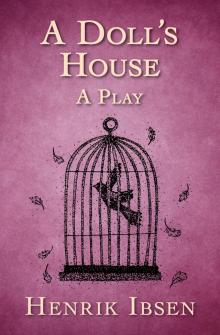 A Doll's House
A Doll's House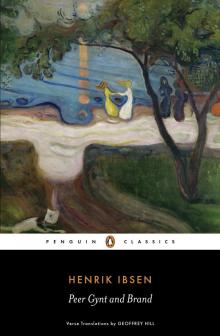 Peer Gynt and Brand
Peer Gynt and Brand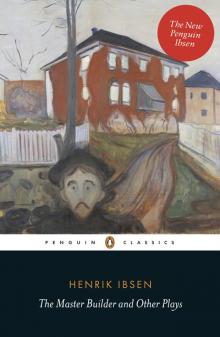 The Master Builder and Other Plays
The Master Builder and Other Plays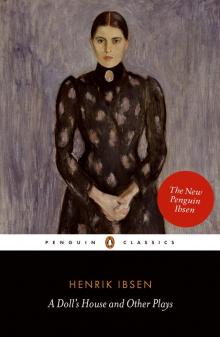 A Doll's House and Other Plays (Penguin)
A Doll's House and Other Plays (Penguin)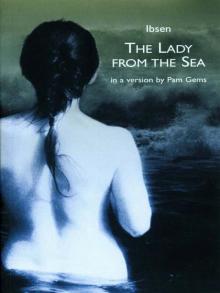 The Lady from the Sea
The Lady from the Sea